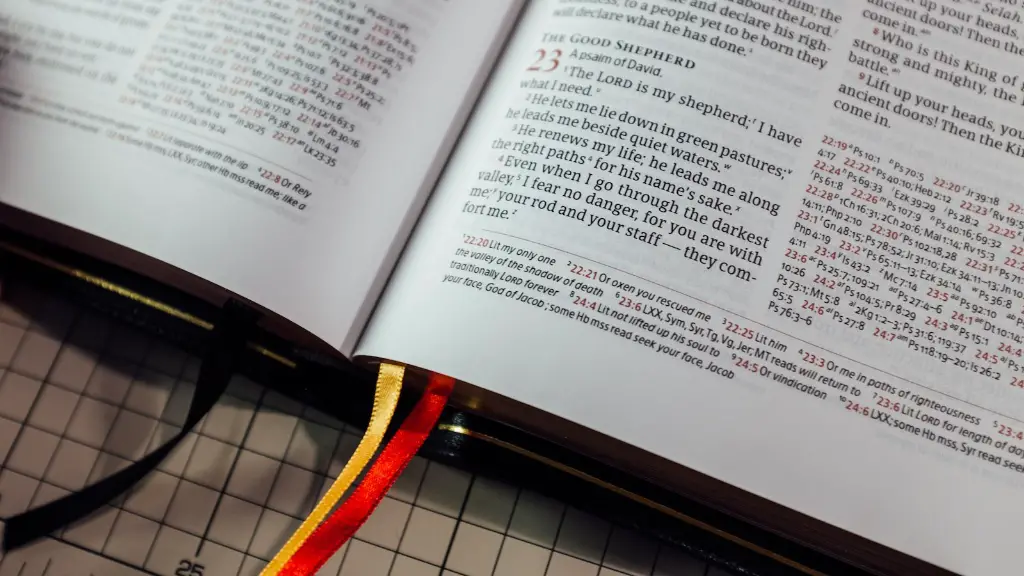Studying the Bible effectively can be a challenge for beginners, simply because of the vast amount of information that needs to be digested. The Bible is a collection of 66 books that represent the teachings of different authors, whose words were recorded over thousands of years. To help you get started, here are some tips for studying the Bible effectively as a beginner.
The first step to studying the Bible effectively is to find a version of the Bible that suits your needs. For example, some people prefer to read the Bible in its original languages. Others may benefit from simpler translations, such as the Good News Bible. Additionally, many Bibles include helpful study questions and other helpful material, so choose one that provides the resources you need.
Once you have found the right Bible, you should spend some time familiarizing yourself with the structure of the Bible, understanding the organization of the various books, and learning the basic rules of interpretation. This will help you to place the various books in their proper contexts and to understand their general message. Additionally, various Bible reference books are available and can help you understand the Bible in greater depth.
Next, it is important to approach the Bible with an attitude and disposition that allow you to be receptive to the text. Spend some time preparing yourself to receive God’s word by praying, worshipping, and meditating. This will open your mind and your heart to the Bible by providing a more meaningful experience as you read.
When you begin to read the Bible, be sure to do so slowly and thoughtfully. What God has to say to us is far too important to be rushed. Clock-watching should have no place in your time of Bible study. Allow each verse to take its true place in your heart, mind, and spirit and come to life in your own life.
Look for ways to apply the Bible to your life. From the outset, keep in mind that the message of the Bible is timeless and that it has relevance in our own lives in the 21st century. Every Bible passage and verse can be used as a prompt for deeper reflection, prayer, and thought. Spend some time with each passage, thinking about how you might apply its teachings to your own life.
Finally, if you want to study the Bible effectively, remember to study with others. The Bible was written to be read, discussed, and understood in community, and this is still true today. Find a Bible study group, or even just a few friends who are studying the Bible. We learn much more together than we do by ourselves.
Practical Exercises
In addition to studying and reading the Bible, it is important to do practical exercises that take you closer to being able to apply the teachings of the Bible to your life. These include memorizing Bible verses, taking notes on your readings, writing out stories that make the Bible come alive, and spending time in prayerful study. It is also helpful to incorporate ways of reflecting on Scripture passages that incorporate the five senses, or involve creative activities such as painting, drawing, and writing.
Engaging Resources
For those who struggle with reading and understanding the Bible, it can be helpful to use Bible-based study applications, audio recordings, and other audio-visual resources to bring the Bible to life. These resources can help break down language barriers and bridge gaps in understanding. Additionally, there are many books and articles available from Christian authors and scholars which discuss the Bible in great depth, providing wider background and context for different books and episodes.
Seeking Understanding From Various Perspectives
Finally, it is important to remember that there is great value in hearing different perspectives on the Bible. No one person holds a monopoly on understanding the Bible, and it is helpful to seek out different interpretations of the same passages to help decide which one is most appropriate to our own lives. Different people can approach the same verses with a variety of interpretations, so it is important to consider them all in light of the context of our own lives and experiences.
Spiritual Guide
Apart from understanding how to read the Bible effectively and performing practical exercises, it is also important to remember to ask God for understanding and guidance as you study His word. When seeking understanding from the Bible, it can be helpful to ask God to give you the ability to make an informed interpretation of passages, apply the teachings of the Bible to your life, and cultivate a deepening relationship with Him.
Find A Study Group
Studying the Bible on one’s own can be a daunting experience, as God’s word is best received when shared. It is important to find a community of believers with whom you can read and discuss the Bible. Sharing ideas, opinions, insights, and interpretations of the Bible among members of a study group can lead to deeper engagement with the Bible and a better understanding of its teachings.
Develop Prayer Journal
Developing a prayer journal is another helpful way of studying the Bible. A prayer journal helps to provide an organized way to place Scripture in your life’s journey. Start by writing down a prayer of thanks, and then add verses that speak to you and your current situation. Also, record other thoughts and reflections that come up during your Bible study.
Use Consistent Bible Study Tool
Finally, it is important to choose a consistent Bible study tool. Consistency will help you to keep track of which passages were studied, how and when. This will also provide a handy reference for future Bible studies. Additionally, you can use a tool that allows for taking notes and sharing insights with a study group.



